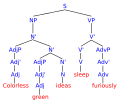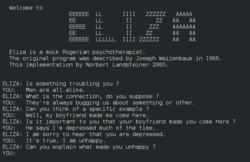In computer science, the expressive power (also called expressiveness or expressivity) of a language is the breadth of ideas that can be represented and...
8 KB (1,000 words) - 19:51, 26 August 2023
phono-semantic matching Expressive power (computer science) of a programming language Expressive suppression, an aspect of emotion regulation Expressive therapies,...
706 bytes (108 words) - 11:40, 31 January 2025
Logic in computer science covers the overlap between the field of logic and that of computer science. The topic can essentially be divided into three...
17 KB (1,837 words) - 22:22, 16 June 2025
Knowledge Sharing" by Tom Gruber used ontology as a technical term in computer science closely related to earlier idea of semantic networks and taxonomies...
60 KB (6,203 words) - 21:05, 1 August 2025
theoretical computer science. The unifying themes in mathematical logic include the study of the expressive power of formal systems and the deductive power of...
215 KB (23,980 words) - 16:25, 30 July 2025
Syntactic sugar (category Computer jargon)
for Computer Science Technical Report 561 (1993) Felleisen, Matthias (December 1991). "On the Expressive Power of Programming Languages". Science of Computer...
17 KB (1,794 words) - 16:48, 30 July 2025
types of problems, and recursion is one of the central ideas of computer science. The power of recursion evidently lies in the possibility of defining an...
62 KB (7,388 words) - 18:24, 20 July 2025
Ω-automaton (section Expressive power of ω-automata)
In automata theory, a branch of theoretical computer science, an ω-automaton (or stream automaton) is a variation of a finite automaton that runs on infinite...
15 KB (2,030 words) - 06:31, 14 April 2025
In computer science, and more specifically in computability theory and computational complexity theory, a model of computation is a model which describes...
4 KB (381 words) - 21:54, 12 March 2025
Formal language (redirect from Language (computer science))
In logic, mathematics, computer science, and linguistics, a formal language is a set of strings whose symbols are taken from a set called "alphabet". The...
27 KB (3,163 words) - 22:12, 19 July 2025
instances, the DSLs are able to offer domain-specific expressive power along with the expressive power of GPL. General Purpose programming languages are all...
14 KB (1,495 words) - 20:14, 20 June 2025
Chinese Expressive Avatar". Affective Computing and Intelligent Interaction. Lecture Notes in Computer Science. Vol. 4738. Springer Science+Business...
44 KB (5,006 words) - 22:04, 19 July 2025
How to Design Programs (redirect from The Structure and Interpretation of the Computer Science Curriculum)
functions, atomic data, and simple structures. Each language adds expressive power to the prior one. Except for the largest teaching language, all languages...
6 KB (741 words) - 09:50, 29 July 2025
Paul Graham (programmer) (redirect from Paul Graham (computer programmer))
1986. He then received a Master of Science in 1988, and a Doctor of Philosophy in 1990, both in computer science from Harvard University. Graham also...
19 KB (1,722 words) - 11:26, 11 June 2025
program and its descendants, further popularising computer music through a 1963 article in Science. The first professional composer to work with digital...
38 KB (4,224 words) - 21:32, 25 May 2025
range of operators for both ease of expression and enhancement of expressive power. PSL makes an extensive use of regular expressions and syntactic sugaring...
17 KB (1,412 words) - 04:44, 31 July 2024
Web Ontology Language (redirect from OWL (computer science))
based on the data explicitly provided. A full introduction to the expressive power of the OWL is provided in the W3C's OWL Guide. OWL ontologies can import...
43 KB (4,300 words) - 22:38, 18 July 2025
Linear grammar (section Expressive power)
In computer science, a linear grammar is a context-free grammar that has at most one nonterminal in the right-hand side of each of its productions. A linear...
6 KB (812 words) - 16:55, 18 February 2025
Linear temporal logic (category Computer-related introductions in 1977)
(PTL). In terms of expressive power, LTL is a fragment of first-order logic. LTL was first proposed for the formal verification of computer programs by Amir...
18 KB (1,832 words) - 09:51, 23 March 2025
languages that do not have the full expressive power of FOL can still provide close to the same expressive power of FOL, but can be easier for both the...
42 KB (5,382 words) - 21:31, 31 July 2025
In computer science and mathematical logic, an infinite-tree automaton is a state machine that deals with infinite tree structures. It can be seen as an...
7 KB (1,122 words) - 03:53, 2 April 2025
query languages for the relational model, are precisely equivalent in expressive power. That is, a database query can be formulated in one language if and...
5 KB (570 words) - 11:58, 22 April 2024
management, self-disclosure, attentiveness, expressivity, composure and other skills contribute to competence in computer mediated communication. In fact, there...
34 KB (3,595 words) - 11:16, 7 June 2025
Datalog (section Expressiveness)
department of Computer Science. Archived from the original on 2017-03-25. Kolaitis, Phokion G.; Vardi, Moshe Y. (1990-04-02). "On the expressive power of datalog:...
58 KB (4,894 words) - 00:46, 5 August 2025
Writing therapy (redirect from Expressive writing)
Writing therapy is a form of expressive therapy that uses the act of writing and processing the written word in clinical interventions for healing and...
41 KB (5,138 words) - 01:57, 28 June 2025
Live coding (category Computer music)
conference presentations, and has been described as a "best practice" for computer science lectures by Mark Guzdial. A range of techniques have been developed...
14 KB (1,530 words) - 01:30, 10 April 2025
365168. S2CID 1896290. Wardrip-Fruin, Noah (2009). Expressive Processing: Digital Fictions, Computer Games, and Software Studies. Cambridge, Massachusetts:...
34 KB (3,815 words) - 20:54, 21 July 2025
Upper ontology (redirect from Upper Ontologies (computer science))
Luciano Serafini; Segio Tessaris (2008). "Complexity of Reasoning with Expressive Ontology Mappings". Formal Ontology in Information Systems. Frontiers...
48 KB (5,733 words) - 21:52, 18 July 2025
Formal grammar (redirect from Grammar (computer science))
developed, both by linguists and by computer scientists, usually either in order to increase their expressive power or in order to make them easier to...
24 KB (3,450 words) - 20:46, 12 May 2025
DNA computing (redirect from DNA computer)
Researchers store information in bacteria DNA International Meeting on DNA Computing and Molecular Programming LiveScience.com-How DNA Could Power Computers...
43 KB (4,929 words) - 15:47, 22 July 2025










